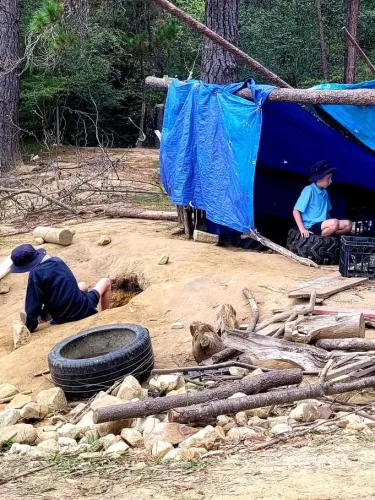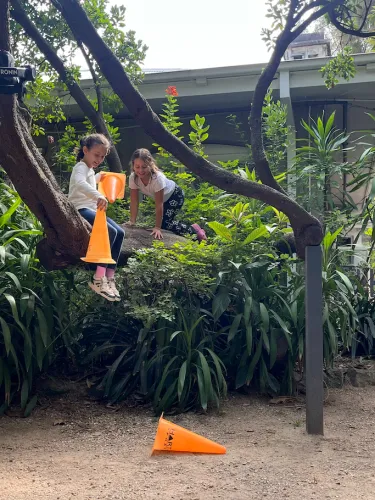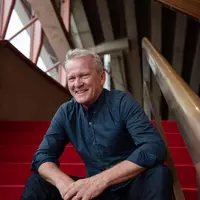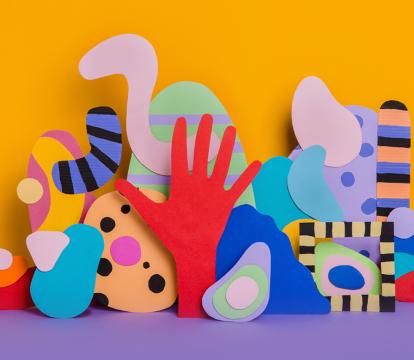Play Award
An annual award for a primary school with a learning program, class or an individual student or teacher, that has made a remarkable and ongoing contribution to ‘play in learning’ with demonstrated positive impacts.
Award Amount: $10,000
About the Play Award
The Sydney Opera House has an ongoing and rich connection with play and its intrinsic connection to the arts and learning. From the inspiring stories on our stages, to the artists who enliven our Centre for Creativity, we are committed to equipping artists and audiences with the capacity and skills to embed play in their classrooms, creative and civic spaces, and everyday life.
It is in this spirit that we continue our relationship with renowned educator Professor Pasi Sahlberg, and present the Sydney Opera House Play Award.
This annual Award (2024–2027 inclusive) will be given to a primary-aged school, learning program, class or an individual student or teacher, who has made a remarkable and ongoing contribution to play in learning with demonstrated positive impact in the school community.
In 2025, the Sydney Opera House Play Award winner was Berrima Primary School. NSW.
Pasi Sahlberg and William Doyle, Let the Children Play: How More Play Will Save Our Schools and Help Children ThrivePlay is how children explore, discover, fail, succeed, socialise and flourish. It is a fundamental element of the human condition. It’s the key to giving schoolchildren skills they need to succeed.
Play Award 2026
- The Play Award is open to any primary school in Australia.
- The Award will be given to a school with a learning program, student/s or teacher/s that has made a remarkable contribution to play in learning with demonstrated positive impact to the school community.
- To be considered for the Award you must submit a written application as outlined below.
- A school can only make one submission. Additional submissions will not be accepted.
- Applications will be accepted in written format through the Sydney Opera House website. More detailed info below.
- Schools, projects, or programs can be self-nominated.
- It is highly recommended that at least one external reference letter is provided with your application. This could be from a student, parent or education authority.
- The Award will be judged by an invited panel of up to 4 external consultants including Professor Sahlberg, and the Sydney Opera House Creative Learning team.
Applications are now open and will close at 5pm Saturday 25 April 2026.
The winner will be announced on International Day of Play on Thursday, 11 June 2026.
For enquiries, please email Jenn Blake, Creative Learning Producer with the subject heading ‘Play Award 2025’.
To apply please respond to the following 3 questions, across no more than 2 A4 pages.
You can attach up to 4 additional image files and/or 3 minutes of video to support your written application.
- Tell us about your play idea or learning program.
Consider the following in your answer:
- How did your play idea get started?
- What is the purpose of your idea?
- What does your idea look like in practice?
- Tell us about the impact of your play idea.
Consider the following in your answer:
- What affect has your idea had on learning?
- What affect has your idea had on wellbeing?
- How does your idea address inequalities of learning?
- How would the Play Award ($10,000) benefit your program and/or school?
2025 Winner
Berrima Public School (NSW)
Berrima Public School’s Playgrounded philosophy infuses lessons with the power of play so that every child, regardless of their background or circumstances, has equal access to play-based learning. Inside the classroom, play is woven into many lessons. Teachers design treasure hunts where solving math problems lead to hidden clues, science labs where children can explore the properties of materials through hands-on experiments, and dramatic play that brings history to life with role-playing activities. Outside of the classroom outdoor spaces are used as living classrooms, where nature walks turn into scavenger hunts. At Berrima Public School play is recognised as the natural language through which children discover the world around them—a joyful and instinctive way of learning about the world and developing the knowledge, skills, understandings and attitudes needed to successfully navigate life.
Berrima Public School Assistant Principal, Joanne Kennedy said, "We are honoured to receive this Award in celebration of the transformative power of play to ignite curiosity, foster creativity, and deepen children’s engagement with the world around them. This recognition of Playgrounded affirms our commitment to creating joyful, inclusive, and imaginative environments where every child can thrive.”
Play Award Judge Kathy Hirsh-Pasek shared praise on behalf of the judging panel, “Berrima show us how public schools can seamlessly build playful learning into the fabric of their educational mission”

Berrima Public School (NSW)
2025 Highly Commended
Banksia Park (SA)
Banksia Park School’s play-based learning initiative is deeply rooted in community connection, staff passion, and a shared vision to recognise the value of unstructured play in childhood development. The school’s program includes nature play sessions for students and community members with younger children, in-class breakout play areas featuring ‘small worlds’, ‘imaginative zones’ and flexible play spaces, a dedicated play room that students access weekly and which is also hosts wellbeing and social-emotional groups for therapeutic play and ‘campfire sessions’ that offer quiet moments of connection, storytelling, and reflection. At Banksia Park play has reignited motivation and engagement across the student cohort and staff collaboration has flourished.
Preshil, The Margaret Lyttle Memorial School (VIC)
Preshil, The Margaret Lyttle Memorial School’s play program “A Backyard for our Children” invites self-led, unprescribed outdoor play, so that children can activate their imagination, and grow their conceptual thinking, through creating their own games and scenarios. There is a forest of bamboo, trees to climb and swing from, dirt mounds to dig and hoses to create dams. Dense shrubberies to hide within, ponds to splash about with, and cubbies and huts that the children build with recycled wood and tools from the school’s outdoor workshop. Indoor spaces are also freely accessible so children can choose how and when they engage in play or in spending time to rest and recentre “A Backyard for our Children” acknowledges that play and recreation is as diverse as children, and prescribed playgrounds often preference sporting play over other styles of recreation. Differentiation in play is inclusive of all children, is open to accepting play in all its forms, is built on the premise of ownership of space, and meets the children where they are, on any given day.

Preshil The Margaret Little Memorial School (VIC)
2024 Winner
Avonvale Primary School (WA)
Meet Pasi Sahlberg
Pasi Sahlberg
Pasi Sahlberg is an author, scholar and educator who has worked as a mathematics and science teacher, teacher-educator, researcher and policy-maker in Finland. He has studied education systems and advised on education system reforms around the world, publishing over 170 academic and professional articles and 22 books on the topic. His most recent book is Let the Children Play! How more play will save our schools and help children thrive (with William Doyle, 2019). He has held numerous advisory roles in international organisations like the World Bank, the European Training Foundation, and has been an education policy expert to the OECD, European Commission and Finnish Governments Foreign Ministry and numerous others.
His research concludes that Australia has schools that are up there with the best in the world, but we tolerate a system where some students experience significant disadvantages. Professor Sahlberg wants to initiate a conversation with the Australian community about how this disparity can be addressed, leading dialogues on international standards, policy and the importance of play for children. He is currently the Professor of educational leadership at the University of Melbourne.

Get involved
We are seeking supporters to grow the scale and ambition of the Play Award. If you are interested in donating towards this award and making play central to our lives and learning, please email Tamara Harrison, Head of Children, Families and Creative Learning.
